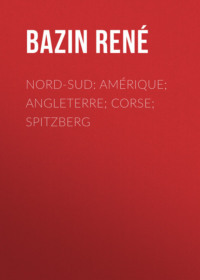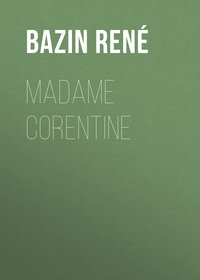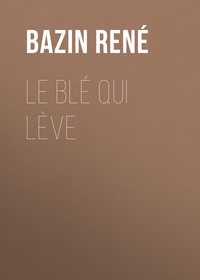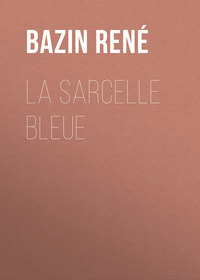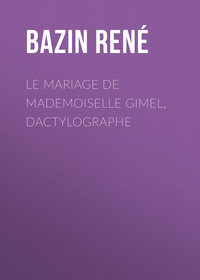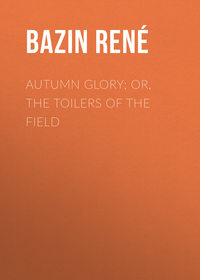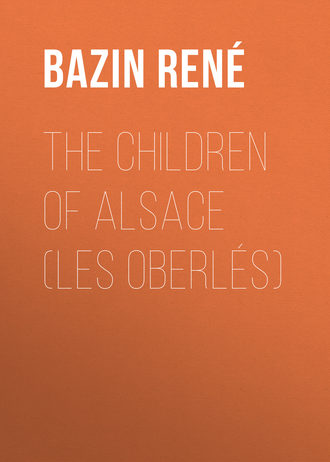 полная версия
полная версияThe Children of Alsace (Les Oberlés)
Jean Oberlé remarked that when he rose Farnow spoke to the commandant, his immediate neighbour, a robust soldier with slow, sure eyes. He was explaining something, and the other approved, with an inclination of his head, at the moment when the lieutenant made the introduction.
"Will the commandant permit me to present to him my comrade, Jean Oberlé, son of the factory owner of Alsheim?"
"Certainly, sir. An intelligent Alsatian – very well known."
Jean's introduction to the captain, a man still young, with straight features, evidently cultured, and no less evidently of a haughty temper, led to the same flattering expressions regarding the factory owner at Alsheim: "Yes, truly Monsieur Oberlé is well known – an enlightened mind. I have had the pleasure of seeing him – kindly remember me to him."
Jean felt humiliated by the marked attentions of these two officers. He had the impression that he was the object of exceptional attention, he, a civilian, a citizen; he, an Alsatian; he, who from every point of view should have been looked upon by these lofty personages as their inferior. "What my father has done then is of great importance," he thought, "that they should requite him in this fashion. Neither his fortune, nor his style of living, nor his conversation, can justify this. He does not live at Strasburg, nor has he filled any office."
A sign from the commandant almost at once put an end to the awkward situation, and gave the young men liberty to go and sit at the table farthest away from the window at the back of the room.
"It is quite by chance that you meet me here," said Farnow, in a slightly sarcastic tone, which revealed the pride of the Prussian lieutenant.
"My regiment is hardly ever here – it is mostly infantry officers who come here… I generally go to the 'Germania' – but we have just been reconnoitring, as you see, and my commandant was very hot… You will pardon me, my dear Oberlé, for having sent for you."
"On the contrary, it was very friendly. You could hardly leave your chiefs."
"And I wanted to renew my acquaintance with you. I have not seen you for so long, not since Munich days. You had just gone past the corner of the house over there, when I said to the servant, 'That is one of my friends! Run and fetch M. Oberlé here!'"
"And truly, you see me very happy, Farnow."
The two young men looked at each other with the curiosity of two beings who try to fill in the unknown years. "What sort of a life has he led? What does he think of me? How far can I trust him?"
"I fancy," said Farnow, "that you have arrived quite recently?"
"Just so; I came at the end of February."
"They told me that you were going to commence your military service in October in the Hussars."
"That is true."
"Do you know, Oberlé, that I had the honour of meeting your father in society last winter? I asked to be introduced."
"Excuse me, I am still such a new-comer…"
Conversation languished at this moment at Carolis, and Jean noticed that the two blue tunics had turned towards him, and that the commandant and the captain were both examining the face of the future volunteer.
They finished drinking the wine like Bordeaux they had ordered in a sealed bottle.
"I should much like to see more of you," said Farnow, lowering his voice. "I hope we shall be able to meet."
"Do you know Alsheim?"
"Yes; I've been through it several times during manœuvres."
The lieutenant was visibly trying to find out how far he could go.
He was in an annexed country; many incidents of daily life had taught him that. He did not care about renewing the experience. He was feeling his way. Should he promise a call? He did not know yet. And this uncertainty, so contrary to his energetic nature; this caution, so wounding to his pride – made him hold up his head as if he were going to pick up a challenge.
Jean, on his side, was disturbed. This simple thing, the receiving a former comrade, seemed to him now a delicate problem to solve. Personally he should have inclined towards the affirmative. But neither Madame Oberlé nor the grandfather would admit any exception to the rule so strictly kept up to now – that no Germans, except quick and commonplace business men, should be admitted to the house of the old protesting deputy. They would never consent. But it was hard for Jean to show himself less tolerant in Strasburg than he had been in Munich, and at the the first meeting on Alsatian ground to offend the young officer who had come to him with hand outstretched. He tried at least to put a note of cordiality into his answer:
"I will come and see you, dear Farnow, with pleasure."
The German understood, frowned, and was silent. Evidently others had refused even to visit him. He did not meet in Oberlé that systematic and complete hostility. His anger did not last, or he did not show it. He reached out his slender hand, the wrist of which looked like a bundle of steel threads covered with skin, and with the tips of his fingers he touched the hilt of his sword, which had not left his side.
"I shall be charmed," he said at last.
He ordered a bottle of Burgundy, and having filled Jean's glass and his own, drank.
"To your return to Alsheim!" he said.
Then, drinking it in a draught, he placed the glass upon the table.
"I am really very pleased to see you again. I live pretty well alone, and you know my tastes outside my profession, which I adore, above which I place nothing whatever, nothing if it be not God, who is the great judge of it. I love hunting best – I think man is made to move in large spaces, to strengthen his power and his dominion over the beasts, when he has not the occasion to do it over his kind. For me there is no pleasure to equal it. Apropos of this, it seems that M. Oberlé has been ousted from his hunting rights?"
"Yes," said Jean; "he has given them up almost entirely – "
"Would you like to have a turn at my place? I have rented some shooting near Haguenau, half wood and half plain; I have roebuck which come from the forest – the ancient Sacred Forest; I have hares and pheasants, and snipe at the time of passage; and if you like glowworms, I have some who fly under the pine-trees and shine like the lances of my Hussars."
The conversation ran on for a while on this subject. Then Farnow finished the bottle of Carolis wine with Jean, and lifting the hawthorn which beflowered his epaulet and letting it drop to the ground, said:
"If you will allow me, Oberlé, I will go some way with you. What direction do you take?"
"Towards the University!"
"That is my way."
The two young men got up together. They were nearly of the same height and figure; both were of an energetic type, although different in expression – Oberlé, careful to relax all that was too serious in his face when at rest; Farnow exaggerating the harshness of his whole personality. The young lieutenant drew down his tunic to take out the creases, took from a chair his flat cap decorated in front with a cockade of the Prussian colours, and walking first with a studied stiffness, half turned towards the table where the commandant and the captain were sitting, saluted them with an almost invisible and several times repeated inclination of the body. The respectful good-fellowship of a short time ago was not now in place. The two chiefs from habit inspected this lieutenant leaving Carolis. Gentlemen themselves, very jealous of the honour of their corps, having learned by heart all the articles of the code of the perfect officer, they interested themselves in all that had to do with the conduct, the attitude, the dress, and the speech of a subordinate, who is the object of public criticism. The examination must have been favourable to Farnow. With a friendly and protective movement of his hand, the commandant dismissed him.
As soon as they were in the street Farnow asked:
"Well, they were perfect, were they not?"
"Yes."
"How you say that? Did you not find them kindly? You ought to see them in the service."
"On the contrary," interrupted Jean, "they were too amiable. I see every day more and more that my father must have humiliated himself very much to be so honoured in high places. And that wounds me, Farnow."
The other looked serious, and said:
"Franzosenkopf! What a strange character this nation has – who cannot accept their position as the conquered, and think themselves dishonoured if Germans make advances to them!"
"It is because they do nothing gratuitously," said Oberlé.
Farnow was not displeased at the word. It seemed to him a kind of homage to the hard, utilitarian temperamant of his race. Besides, the young lieutenant would not enter into a discussion where he knew that friendships ran the risk of being spoilt. He greeted a young woman, who came towards him, and followed her with his eyes.
"That is the wife of Captain von Holtzberg. Pretty, isn't she?"
Then pointing to the left, beyond the bridge to the quarters of the old city, illumined by the vaporous light of this spring morning, he added, as if the two thoughts were united naturally in his mind:
"I like this old-world Strasburg. How feudal it is!"
Above the river, whose waters were soiled by works and sewers, rose the long sloping roofs, with their high dormer windows, the tiles of all shades of red – the mediæval purple of Strasburg, mended, patched, and spotted, and washed, violet in places, nearly yellow in others adjoining, rose-colour on certain slopes, orange-coloured in some lights, royally beautiful everywhere and stretched out like a marvellous Eastern carpet of soft faded silks round the cathedral. The cathedral itself, built in red stone, viewed from this point, seemed to have been, and still to be, the pattern which had decided the colour of all the rest; it was the ornament, the glory, and the centre of all. A stork, with open wings, cleaving the air with wide strokes, as an oarsman cleaves water, his feet horizontally prolonging his body and acting as rudder, his bill a little raised like a prow, an heraldic bird, was flying through the blue, faithful to Strasburg, like all its ancient race, protected, sacred like the place, and always returning to the same nests above the same chimney stacks.
Jean and Farnow saw it inclining towards the cathedral spire, and seen from behind, foreshortened, it looked like some bird beating the air with its bow of feathers, and then it disappeared.
"These are the inhabitants," said Farnow, "whom neither the smoke of our factories, nor the tramways, nor the railways, nor the new palaces, nor the new order of things can astonish."
"They have always been German," said Jean with a smile. "The storks have always worn your colours – white belly, red bill, black wings."
"So they have," said the officer, laughing.
He went on his way along the quays, and almost immediately stopped laughing. Before him, coming from the direction of the new part of the town, an artillery soldier was leading two horses, or rather he was being led by them. He was drunk. Walking between the two brown horses, holding the reins in his raised hands, he went on stumbling, knocking against the shoulder of one or the other of the beasts, and to save himself from falling, dragged from time to time at one of them, which resisted and moved away.
"What is this?" growled Farnow – "a drunken soldier at this time of day!"
"A little too much malt spirit," said Oberlé. "He is not merry in drink."
Farnow did not answer. Frowning, he watched the man who was approaching, and who was only about ten yards away.
At this distance, according to regimental rules, the man ought to have walked in step and turned his head in the direction of his superior officer. Not only had he forgotten all his instruction and continued to roll painfully between the horses; but at the moment when he had to pass Farnow he murmured something, no doubt an insult.
That was too much. The lieutenant's shoulders shook with anger for a moment, and then he marched straight to the soldier, whose frightened horses backed. The officer felt humiliated for Germany.
"Halt!" he cried. "Stand straight!"
The soldier looked at him, stupefied, made an effort, and succeeded in standing still and nearly erect.
"Your name?"
The soldier told his name.
"You will have your punishment at the barracks, you brute! But in expectation of better things, take this on account, for dishonouring the uniform as you have!"
Saying this, he stretched his right arm out at full length, and with his gloved hand, hard as steel, he hit the man on the face. The blood ran out at the corner of his mouth; he squared his shoulders; he drew up his arms as if about to box. The soldier must have been terribly tempted to retaliate. Jean saw the wandering eyes of the drunkard when he was thus thrust backwards, turn right round in their sockets with pain and rage. Then they looked down on the pavement, overcome by a confused and terrifying remembrance of the power of the officer.
"Now march!" cried Farnow. "And do not stumble!"
He was in the middle of the quay – erect, booted, a head higher than his victim, as it were surrounded by sunlight, with flashing eyes, the lower lids and the corners of his lips wrinkled by anger; and those who called him "Death's Head" must have caught a glimpse of him like that.
The loafers who had hurried up to witness the scene and formed a circle, stood aside at the order of the lieutenant, and let the soldier pass through, who was trying not to pull the reins too hard. Then, as a certain number of them remained gathered together, either silent or merely muttering their opinion, Farnow, turning on his heels and crossing his arms, looked at them one after the other. The little bank clerk went by first, adjusting his eyeglasses; then the milk-woman with her copper pot on her hip passed on by herself, shrugged her shoulders, ogling Farnow; then the butcher who had come from the neighbouring shop; then two boatmen who tried to look as if they did not care, although both had flushed faces; then the urchins who at first wanted to cry, and who now nudged each other and went off laughing. The officer drew near to his companion, who had remained on the left near the canal.
"I think you went a little too far," said Oberlé. "What you have just done is forbidden by the Emperor's express orders. You risk a reprimand."
"That is the only way to treat those brutes!" said Farnow, his eyes still blazing. "Besides, believe me, he has already passed on my blow to his horses, and to-morrow he will have forgotten all about it."
The two young men walked side by side to the University gardens, without speaking to each other, thinking over what had just happened. Farnow put on a new pair of gloves to replace the others, probably soiled by the soldier's cheek. He bent towards Jean, saying gravely and with evident conviction:
"You were very young when I met you, my dear fellow. We shall have to tell each other a few things before we shall know exactly our respective opinions on many points.
"But I am astonished that you have not yet perceived, you who have stayed so long in all the German provinces, that we were born to conquer the world, and that conquerors are never gentle men, nor ever perfectly just."
He added, after a few steps:
"I should be vexed if I have hurt your feelings, Oberlé; but I cannot hide from you that I do not regret what I did. Only understand that behind my anger there is discipline, the inviolable prestige and dignity of the army of which I am a unit. Do not report the incident to your people, dear fellow, without also adding the excuse for it. That would mean to betray a friend. Well, good-bye."
He held out his hand. His blue eyes lost for the moment something of their haughty indifference.
"Good-bye, Oberlé! Here is the door of your Clerk of the Forests."
CHAPTER IX
THE MEETING
Jean came back in fairly good time to the Strasburg station and took the train to Obernai, where he had left his bicycle. While going from Obernai to Alsheim he saw in the meadows through which the Dachs ran, near Bernhardsweiler, a second stork – motionless on one leg.
This was the first thing he told Lucienne, whom he met under the trees in the park. She was reading, and wore a grey linen dress with lace on the bodice. When she heard the noise of the bicycle on the gravel she lifted her intelligent eyes, smiling.
"My dear, how I have missed you. What in the world makes you go away so constantly?"
"I make discoveries, dear sister. First, I have seen two storks, arriving on the sacred day – April 23 – punctual as lawyers."
A slight pout of her red lips showed that the news did not interest her much.
"Then?"
"I spent three hours in the offices of the Forest Conservators, where I learned that – "
"You can tell all that to father," she interrupted. "I see so much wood here, living and dead, that I have no wish to occupy my mind with it unnecessarily. Tell me some Strasburg news, or about some costumes, or some conversation you had with some one in society."
"That is true," said the young man, laughing. "I did meet some one."
"Interesting?"
"Yes; an old acquaintance of Munich, a lieutenant in the Hussars."
"Lieutenant von Farnow?"
"Yes, the very man – Lieutenant Wilhelm von Farnow, lieutenant in the 9th Rhenish Hussars. What is the matter?"
They were halfway down the avenue, hidden by a clump of shrubs. Lucienne, bold and provoking as ever, crossed her arms and said, in a quieter tone of voice:
"Only this – he loves me."
"He?"
"And I love him!"
Jean stepped away from his sister in order to see her better.
"It is not possible!"
"And why not?"
"Why, Lucienne, because he is a German, an officer – a Prussian!"
There was silence; the blow had struck home. Jean, quite pale, went on:
"You must also know that he is a Protestant."
She flung her book on the seat and, holding up her head, quivering all over at the protest:
"Do you imagine I have not thought it all over? I know all you can possibly say. I know that the people in the midst of whom we live in Alsace here, intolerant and narrow-minded as they are, will not hesitate to say what they think on the subject. Yes; they will make a fuss, they will blame me and pity me and try to make me give way. And you; are you not beginning the game? But I warn you that arguments are quite useless – all your arguments. I love him. It is not to be done, it is done. I have only one wish, and that is to know if you are on my side or against me. For I shall not alter my mind."
"Oh, my God! my God!" cried Jean, hiding his face in his hands.
"I never thought it could hurt you so much. I do not understand. Do you share their stupid hatred? Tell me. I am putting a strong control on my feelings that I may talk to you. Tell me then. Speak. You are paler than I am – I, whom this alone concerns."
She caught hold of his hands and uncovered his face. And Jean gazed at her strangely for a moment as do those whose look does not as yet correspond with their thoughts.
Then he said:
"You are mistaken; we are both concerned, Lucienne!"
"Why?"
"We are one against the other, because I, too, must tell you that I love – I love Odile Bastian!"
She was terrified at what she foresaw in connection with this name; she was touched at the same time because the argument had reference to love, and was a confidence. Her irritation passed at once. She put her head on her brother's shoulder. The curls of her fair hair intermixed with auburn lay ruffled and disordered against Jean's neck.
"Poor, dear Jean," she murmured. "Fate pursues us. Odile Bastian and the other. Two love affairs which exclude each other! Oh! my poor dear, it is the drama of our family perpetuating itself through us!" She straightened herself, thinking she heard a step, and taking her brother's arm went on nervously: "We cannot talk here, but we must talk about other than merely surface things. If father suddenly came across us, or mamma, who is working in the drawing-room at heaven knows what everlasting piece of embroidery. Ah, my dear, when I think that only a few steps away from her we are exchanging such secrets as these, which she little suspects! But first we must think of ourselves, must we not? Ourselves…!" For a moment she thought of returning to the house, and of going up to her room with Jean. Then she decided on a better place of refuge. "Come into the fields, there no one will disturb us."
Arm-in-arm, hastening their steps, speaking to each other in low tones and short sentences, they went through the gate, passed the end of the enclosure, and to the right of the road, which was higher than the surrounding land; they went down a sloping path, which could be seen like a grey ribbon winding its seemingly endless way through the young corn. Already each of them, after the first moment of surprise, of dejection, and of real pain caused by the thought of what the other would suffer, had come back to thoughts of self.
"Perhaps we are wrong to worry ourselves," said Lucienne, entering the path. "Is it certain that our plans are irreconcilable?"
"Yes. Odile Bastian's mother will never agree to her daughter becoming the sister-in-law of a German officer."
"And how do you know that this officer would not perhaps prefer marrying into a family a little less behind the times than ours?" said Lucienne, hurt. "Your plan may also injure mine."
"Pardon me; I know Farnow – nothing will stop him."
"To tell the truth, I think so too!" said the young girl, looking up, and blushing with pride.
"He is one of those who are never in the wrong."
"Exactly so."
"You share his ambitions."
"I flatter myself that I do."
"You can rest assured then: he will have no hesitation. The scruples will come from the Bastian side, who are the souls of honour…"
"Ah! if he heard you," said Lucienne, letting go her brother's arm, "he would fight you."
"What would that prove?"
"That he felt your insult as I felt it myself, Jean. For Lieutenant von Farnow is a man of honour!"
"Yes, in his way – which is not our way."
"Very good! Very noble!"
"Rather feudal, this nobility of theirs. They have not had the time to have that of a later date. But after all it does not matter. I am not in a mood for discussion. I suffer too much. All I wish to say is that when I ask for Odile's hand I shall be refused. I foresee it, I am sure of it; and that von Farnow will not understand why, and if he did understand he would not withdraw, he would never think of sacrificing himself. In speaking like this, I am not slandering him. I simply understand him."
They walked on, enveloped in an atmosphere of light and warmth, which they did not enjoy, between long strips of young corn, smiling unnoticed around them. In the plain, some labourers seeing them pass side by side, walking together, envied them. Lucienne could not deny that her brother's forebodings were reasonable. Yes, it must be so, judging from what she herself knew of Lieutenant von Farnow and the Bastians. In any other circumstance she would have pitied her brother, but personal interest spoke louder than pity. She felt a kind of disturbed joy when she heard Jean acknowledge his fears. She felt encouraged not to be generous, because she felt he was anxious. Not being able to pity him, she at any rate drew near to him, and talked to him about herself.
"If we had lived together longer, Jean," she said, "you would have known my ideas on marriage, and I should astonish you less to-day. I had made up my mind to marry only a very rich man. I dislike the fear of what to-morrow may bring; I want certainty and to lead…"
"The conditions are fulfilled," said Jean, with bitterness. "Farnow has a vast property in Silesia. But at the same time he is also lieutenant in the 9th regiment of Rhenish Hussars!"
"Well!"
"Officer in an army against which your father has fought, your uncle has fought, and all your relations, every one old enough to carry arms."
"Quite right. And I would not have asked anything better than to marry an Alsatian. Perhaps I even wished to do so without saying anything about it. But I did not find what I wished. Nearly all who had name, fortune, or influence have chosen France; that is to say, they all left Alsace after the war. They called it patriotism. Truly, words can serve every use. Who remain? You can easily count the young people of Alsatian origin belonging to wealthy families, and who could have aspired to the hand of Lucienne Oberlé."




